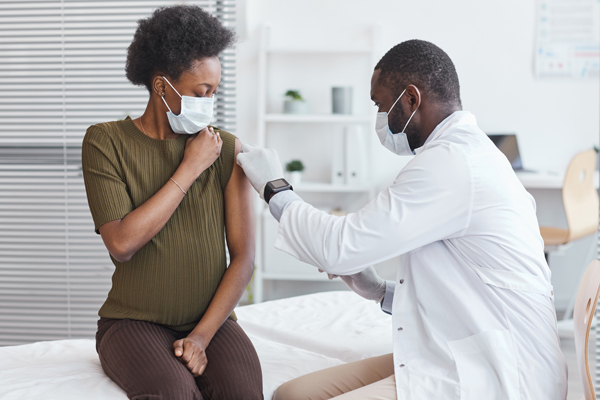A US study of 46 079 pregnancies has found that vaccination against covid-19 was safe and did not increase the risk of preterm birth or small for gestational age babies.
Pregnant women and those planning to get pregnant are included in vaccination programmes worldwide, but hesitancy has been widely reported because of concerns about vaccine safety.
Unvaccinated pregnant women who get symptomatic covid-19 have a 70% risk of death compared with non-pregnant women with symptomatic infections, according to the researchers of the latest study from Yale University. They face more than double the risk of needing admission to an intensive care unit, intensive ventilation, and extracorporeal membrane oxygenation.
This retrospective cohort study is a collaboration between the Centers for Disease Control and Prevention and eight Vaccine Safety Datalink healthcare organisations that represent about 3% of the US population. It followed a group of women aged 16-49 who had an estimated start of pregnancy between May and October 2020 and expected delivery dates of February to July 2021.
Some 46 079 women with singleton pregnancies, data on gestational age, and a live birth were included in the study, one in five of whom (21.8%, 10 064) had received one or more vaccine doses. Nearly all (9892 or 98.3%) were vaccinated during the second or third trimester—which, the authors noted, are critical periods for fetal growth and development. Most women received an mRNA vaccine, either Pfizer BioNTech (54.5%) or Moderna (41.4%). Only 424 (4.2%) received the Janssen (Johnson & Johnson) vaccine. Of the 9640 women who received an mRNA vaccine, 1759 (18.2%) received one dose and 7881 (81.8%) received two doses.
Compared with unvaccinated women vaccination during pregnancy was not associated with preterm birth (adjusted hazard ratio 0.91; 95% confidence interval=0.82 to 1.01; P=0.06) or small for gestational age at birth in the 40 627 live births for which birthweight was available (adjusted hazard ratio=0.95; 95% CI=0.87 to 1.03, P=0.24).
When considering vaccination by trimester for the first (or only) dose, there was “no association with increased risk for preterm or small for gestational age at birth,” the researchers said. They added that studies from Israel and the UK also showed no difference in outcome between women who were vaccinated during pregnancy and those who were not.
They concluded, “Findings from this retrospective, multisite cohort of a large and diverse population with comprehensive data on vaccination, comorbidities, and birth outcomes add to the evidence supporting the safety of covid-19 vaccination during pregnancy.”

